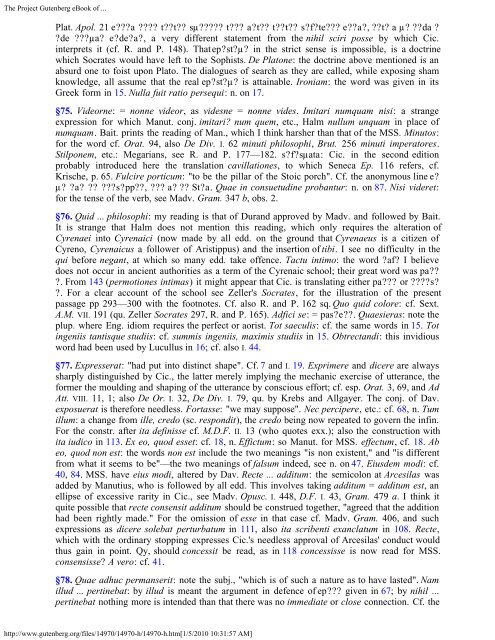academica of cicero. - 912 Freedom Library
academica of cicero. - 912 Freedom Library
academica of cicero. - 912 Freedom Library
You also want an ePaper? Increase the reach of your titles
YUMPU automatically turns print PDFs into web optimized ePapers that Google loves.
The Project Gutenberg eBook <strong>of</strong> ...<br />
Plat. Apol. 21 e???a ???? t??t?? sµ????? t??? a?t?? t??t?? s?f?te??? e??a?, ??t? a µ? ??da ?<br />
?de ???µa? e?de?a?, a very different statement from the nihil sciri posse by which Cic.<br />
interprets it (cf. R. and P. 148). That ep?st?µ? in the strict sense is impossible, is a doctrine<br />
which Socrates would have left to the Sophists. De Platone: the doctrine above mentioned is an<br />
absurd one to foist upon Plato. The dialogues <strong>of</strong> search as they are called, while exposing sham<br />
knowledge, all assume that the real ep?st?µ? is attainable. Ironiam: the word was given in its<br />
Greek form in 15. Nulla fuit ratio persequi: n. on 17.<br />
§75. Videorne: = nonne videor, as videsne = nonne vides. Imitari numquam nisi: a strange<br />
expression for which Manut. conj. imitari? num quem, etc., Halm nullum unquam in place <strong>of</strong><br />
numquam. Bait. prints the reading <strong>of</strong> Man., which I think harsher than that <strong>of</strong> the MSS. Minutos:<br />
for the word cf. Orat. 94, also De Div. I. 62 minuti philosophi, Brut. 256 minuti imperatores.<br />
Stilponem, etc.: Megarians, see R. and P. 177—182. s?f?sµata: Cic. in the second edition<br />
probably introduced here the translation cavillationes, to which Seneca Ep. 116 refers, cf.<br />
Krische, p. 65. Fulcire porticum: "to be the pillar <strong>of</strong> the Stoic porch". Cf. the anonymous line e?<br />
µ? ?a? ?? ???s?pp??, ??? a? ?? St?a. Quae in consuetudine probantur: n. on 87. Nisi videret:<br />
for the tense <strong>of</strong> the verb, see Madv. Gram. 347 b, obs. 2.<br />
§76. Quid ... philosophi: my reading is that <strong>of</strong> Durand approved by Madv. and followed by Bait.<br />
It is strange that Halm does not mention this reading, which only requires the alteration <strong>of</strong><br />
Cyrenaei into Cyrenaici (now made by all edd. on the ground that Cyrenaeus is a citizen <strong>of</strong><br />
Cyreno, Cyrenaicus a follower <strong>of</strong> Aristippus) and the insertion <strong>of</strong> tibi. I see no difficulty in the<br />
qui before negant, at which so many edd. take <strong>of</strong>fence. Tactu intimo: the word ?af? I believe<br />
does not occur in ancient authorities as a term <strong>of</strong> the Cyrenaic school; their great word was pa??<br />
?. From 143 (permotiones intimas) it might appear that Cic. is translating either pa??? or ????s?<br />
?. For a clear account <strong>of</strong> the school see Zeller's Socrates, for the illustration <strong>of</strong> the present<br />
passage pp 293—300 with the footnotes. Cf. also R. and P. 162 sq. Quo quid colore: cf. Sext.<br />
A.M. VII. 191 (qu. Zeller Socrates 297, R. and P. 165). Adfici se: = pas?e??. Quaesieras: note the<br />
plup. where Eng. idiom requires the perfect or aorist. Tot saeculis: cf. the same words in 15. Tot<br />
ingeniis tantisque studiis: cf. summis ingeniis, maximis studiis in 15. Obtrectandi: this invidious<br />
word had been used by Lucullus in 16; cf. also I. 44.<br />
§77. Expresserat: "had put into distinct shape". Cf. 7 and I. 19. Exprimere and dicere are always<br />
sharply distinguished by Cic., the latter merely implying the mechanic exercise <strong>of</strong> utterance, the<br />
former the moulding and shaping <strong>of</strong> the utterance by conscious effort; cf. esp. Orat. 3, 69, and Ad<br />
Att. VIII. 11, 1; also De Or. I. 32, De Div. I. 79, qu. by Krebs and Allgayer. The conj. <strong>of</strong> Dav.<br />
exposuerat is therefore needless. Fortasse: "we may suppose". Nec percipere, etc.: cf. 68, n. Tum<br />
illum: a change from ille, credo (sc. respondit), the credo being now repeated to govern the infin.<br />
For the constr. after ita definisse cf. M.D.F. II. 13 (who quotes exx.); also the construction with<br />
ita iudico in 113. Ex eo, quod esset: cf. 18, n. Effictum: so Manut. for MSS. effectum, cf. 18. Ab<br />
eo, quod non est: the words non est include the two meanings "is non existent," and "is different<br />
from what it seems to be"—the two meanings <strong>of</strong> falsum indeed, see n. on 47. Eiusdem modi: cf.<br />
40, 84. MSS. have eius modi, altered by Dav. Recte ... additum: the semicolon at Arcesilas was<br />
added by Manutius, who is followed by all edd. This involves taking additum = additum est, an<br />
ellipse <strong>of</strong> excessive rarity in Cic., see Madv. Opusc. I. 448, D.F. I. 43, Gram. 479 a. I think it<br />
quite possible that recte consensit additum should be construed together, "agreed that the addition<br />
had been rightly made." For the omission <strong>of</strong> esse in that case cf. Madv. Gram. 406, and such<br />
expressions as dicere solebat perturbatum in 111, also ita scribenti exanclatum in 108. Recte,<br />
which with the ordinary stopping expresses Cic.'s needless approval <strong>of</strong> Arcesilas' conduct would<br />
thus gain in point. Qy, should concessit be read, as in 118 concessisse is now read for MSS.<br />
consensisse? A vero: cf. 41.<br />
§78. Quae adhuc permanserit: note the subj., "which is <strong>of</strong> such a nature as to have lasted". Nam<br />
illud ... pertinebat: by illud is meant the argument in defence <strong>of</strong> ep??? given in 67; by nihil ...<br />
pertinebat nothing more is intended than that there was no immediate or close connection. Cf. the<br />
http://www.gutenberg.org/files/14970/14970-h/14970-h.htm[1/5/2010 10:31:57 AM]















